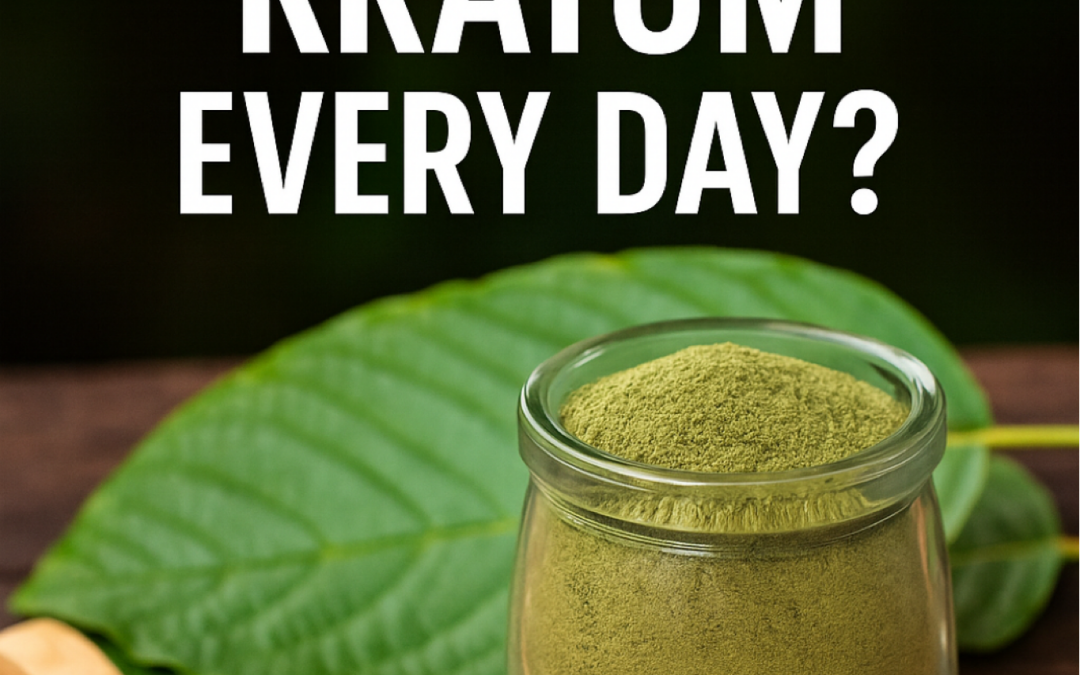
by KratomUSA | Jun 30, 2025 | Kratom
🌿 Can You Take Kratom Every Day?
Exploring the Long-Term Effects, Benefits, and Risks
Kratom (Mitragyna speciosa) has steadily grown in popularity across the United States, praised for its potential to support pain relief, energy, mood, and even withdrawal management. But with daily use on the rise, a critical question emerges:
Can you take kratom every day—and is it safe in the long run?
Whether you’re considering kratom for chronic pain or already use it to manage stress or fatigue, understanding the long-term effects is key to making informed, healthy choices.
📌 Key Points: Daily Kratom Use at a Glance
-
🧠 Kratom contains over 40 active alkaloids that interact with the brain and body
-
🔁 Long-term daily use can lead to tolerance and dependence, especially at higher doses
-
⚖️ Research on kratom’s long-term effects is still limited but growing
-
🧪 Several studies suggest kratom may have therapeutic potential, but risks increase with frequency
-
✅ Responsible use, dosage rotation, and rest days may help reduce long-term risks
-
🛒 Choosing a trusted vendor (like KratomUSA.com) ensures purity and safety
🧬 What Happens When You Take Kratom Every Day?
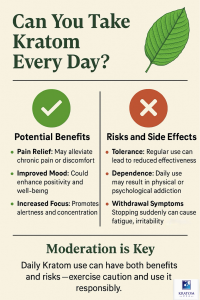 The effects of kratom vary depending on the dose, strain, and the user’s physiology. At low doses, kratom tends to act as a stimulant, promoting energy and focus. At higher doses, it acts more like a sedative or analgesic.
The effects of kratom vary depending on the dose, strain, and the user’s physiology. At low doses, kratom tends to act as a stimulant, promoting energy and focus. At higher doses, it acts more like a sedative or analgesic.
With daily use, your body may begin to build tolerance to these effects. That means users might need higher doses over time to achieve the same results—similar to how caffeine or nicotine works.
In some cases, this can lead to:
-
Reduced effect (tolerance)
-
Mild physical discomfort when stopping
-
Psychological dependence (in some chronic users at high doses)
📚 What Does the Research Say?
Scientific studies on kratom’s long-term safety are still emerging, but here’s what we know:
✅ Potential Benefits:
-
A 2017 survey of 8,049 users published in the journal Drug and Alcohol Dependence found that many used kratom daily or near-daily to manage pain, depression, or opioid withdrawal—reporting overall satisfaction and functionality improvements.
-
A study published in Frontiers in Psychiatry concluded that kratom may have “low harm potential” when used moderately and responsibly.
⚠️ Potential Risks:
-
A 2015 study in Journal of Psychoactive Drugs observed that long-term users in Malaysia experienced dependency symptoms when using high doses daily for years.
-
According to the FDA, kratom use has been linked to rare but real cases of liver toxicity, though most of these were tied to adulterated or contaminated products.
In short, kratom appears relatively safe for most users at moderate, controlled doses, but heavy, chronic use can lead to complications.
🧠 How to Use Kratom Responsibly
Experts and long-time users alike agree that moderation is key to preventing problems with daily kratom use.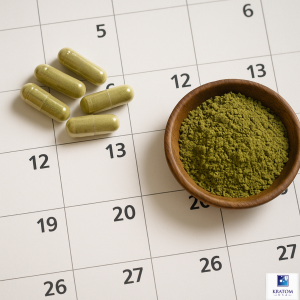
Here are smart practices for long-term safety:
🔄 Rotate Strains
Using different kratom strains (like red, green, and white varieties) helps reduce receptor desensitization.
📅 Schedule Rest Days
Many users take 1–2 days off per week to reset their system and avoid dependency.
📉 Use the Lowest Effective Dose
Stay at the lowest dose that gives you results. This is crucial to minimizing long-term effects.
🔬 Buy Lab-Tested Kratom
Vendors like Kratom USA offer lab-tested, additive-free kratom. Poor-quality kratom poses significantly higher health risks.
💬 What Real Users Say
“I’ve taken kratom every day for over two years to manage chronic back pain. I rotate strains, take breaks, and haven’t increased my dose. It’s helped me avoid opioids completely.”
— Jeremy M., Texas
“When I started taking kratom daily for anxiety, I felt a huge improvement. But after a few months, I noticed I needed more to feel the same effect. Taking weekends off helped reset things.”
— Rachel G., North Carolina
“I’ve been using kratom daily for almost two years to manage my lower back pain, and it’s been a game changer. I rotate strains and take a couple days off each week to avoid tolerance. As long as you’re mindful, it can be a great natural tool.”
— Laura P., Charlotte, NC
“I was skeptical at first, but kratom has helped me stay focused and calm through long workdays. I take a small dose in the morning and sometimes in the afternoon. It’s not a cure-all, but it’s made a noticeable difference for me.”
— Derek H., Portland, OR
🔍 Is Kratom Addictive?
Kratom does not cause classic opioid-like addiction, but it can result in habit formation or mild withdrawal symptoms, especially in users taking large daily doses (10+ grams/day).
Common withdrawal symptoms include:
-
Irritability
-
Fatigue
-
Muscle aches
-
Insomnia
Most cases are mild and short-lived, especially compared to traditional opioid withdrawal.
❓ FAQ: Can You Take Kratom Daily?
Is daily kratom use safe?
Daily use may be safe for many individuals if taken at low to moderate doses, with rest days and strain rotation. However, long-term safety data is still being researched.
Can kratom cause addiction?
Kratom may lead to dependence with heavy use, but the risk appears lower than with traditional opioids, especially with responsible practices.
What’s the best way to avoid tolerance?
Are there any long-term health risks?
In rare cases, users report liver issues or dependence, especially with unregulated products. Stick to lab-tested kratom from trusted vendors.
Can kratom improve mental health or mood?
Many users report improved mood, focus, and anxiety relief, but long-term daily use may lessen these effects over time without proper management.
🌿 Final Thoughts: Daily Kratom Use Isn’t One-Size-Fits-All
So—can you take kratom every day? The answer is yes, but with caution.
If used responsibly, kratom may offer real relief and quality-of-life benefits for those dealing with chronic pain, fatigue, anxiety, or low mood. But as with any botanical, balance is essential. Monitoring your usage, sticking to safe sourcing, and listening to your body are key to sustainable kratom use.
🛒 Want to try kratom that’s pure, potent, and lab-tested?
Visit KratomUSA.com — America’s most trusted source for premium kratom.

by KratomUSA | Jun 28, 2025 | Kratom
🌿 Where Can I Buy High-Quality Kratom Online?
Discover Why KratomUSA.com Is America’s Trusted Source
Kratom, the tropical botanical known for its natural pain-relieving, energizing, and mood-supporting properties, has gained popularity in wellness communities across the US. But with its rising demand, comes a flood of online vendors—many of whom lack transparency, lab testing, or reliable sourcing. So if you’re wondering where can I buy high-quality kratom online, take a look at this information before you choose a vendor.
👉 The answer many seasoned users turn to: KratomUSA.com
As one of the oldest and most reputable kratom vendors in the United States, Kratom USA has built a trusted name through years of consistent quality, customer support, and deep industry knowledge.
📌 Key Points: Why Kratom USA Stands Out
-
✅ One of the longest-standing kratom companies in the US
-
🧪 All products are lab-tested for purity, potency, and safety
-
🌱 Offers a wide range of kratom strains in powder, capsule, and extract form
-
📦 Fast, discreet shipping and same-day fulfillment on weekday orders
-
🛡️ Transparent sourcing from trusted Southeast Asian farms
-
🤝 Exceptional customer service and thousands of loyal customers
-
💳 Secure checkout and easy ordering experience
🧬 What Makes a Kratom Vendor “High Quality”?
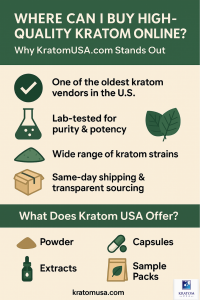 When evaluating an online kratom seller, these criteria are essential:
When evaluating an online kratom seller, these criteria are essential:
-
Lab Testing & Transparency
-
Reputation and Longevity
-
Product Variety & Strain Knowledge
-
Different strains affect users in different ways—green for energy, red for relaxation, white for focus.
-
Kratom USA offers strain-specific descriptions to help you choose confidently.
-
Customer Support & Policies
🌎 Why Experience Matters in the Kratom Industry
Kratom USA didn’t just pop up during the recent wave of wellness trends—it’s been around for over a decade. That means:
-
They’ve built relationships with trusted Southeast Asian farmers
-
They’ve seen and adapted to regulatory changes and safety standards
-
They’ve developed a customer base that relies on consistency and trust
Their longevity means they know what makes great kratom—and they deliver it consistently.
🧠 What Do Studies Say About Kratom’s Potential?
Scientific studies suggest kratom’s alkaloids—like mitragynine and 7-hydroxymitragynine—may provide:
-
✅ Pain relief by binding to mu-opioid receptors (Hemby et al., 2019, Frontiers in Pharmacology)
-
✅ Mood enhancement through serotonin and dopamine modulation (Singh et al., 2018, Drug and Alcohol Dependence)
-
✅ Energy and focus support in low to moderate doses
➡️ But quality matters. Poorly sourced kratom may contain contaminants or be too weak to produce these effects.
🛍️ What Products Can I Find at KratomUSA.com?
Kratom USA offers a full lineup of lab-tested kratom options, including:
| Product Type |
Description |
| 🌿 Powder |
Fine-ground leaves in dozens of strains |
| 💊 Capsules |
Pre-measured, easy-to-take doses |
| 💧 Extracts |
Potent options for advanced users |
| 🔄 Sample Packs |
Great for first-time buyers |
Popular strains include:
🚚 Shipping, Safety & Support: What to Expect
-
📦 Orders placed before 2 PM EST ship same business day
-
🛡️ Discreet, secure packaging
-
🧪 Products undergo independent lab testing
-
💬 Friendly and helpful customer support team
❓ FAQ: Buying High-Quality Kratom Online
Is Kratom USA a legitimate vendor?
Yes—KratomUSA.com is one of the oldest kratom vendors in the U.S., with a reputation for consistent quality and professional customer care.
Is their kratom lab-tested?
Absolutely. Every batch is tested for heavy metals, pathogens, and alkaloid content.
Do they offer a money-back guarantee?
Yes. Kratom USA offers a satisfaction guarantee, which means you can shop risk-free.
Are there kratom strains for specific needs?
Yes. For example:
-
Red strains may support pain relief and sleep
-
Green strains often promote energy and mood
-
White strains may improve focus and motivation
How fast is shipping?
Orders placed before 2 PM EST ship the same business day, with multiple shipping options available.
🌿 Final Thoughts: Trust Matters When Buying Kratom
In a market flooded with new vendors, experience, transparency, and quality are everything. KratomUSA.com checks all the boxes:
✅ Lab-tested
✅ Longstanding reputation
✅ Diverse product selection
✅ Knowledgeable, friendly service
If you’re looking for a reliable source of high-quality kratom online, Kratom USA is the smart choice.

by KratomUSA | Jun 26, 2025 | Kratom
🧠 Kratom and ADHD: Can This Natural Herb Support Focus and Calm?
Attention Deficit Hyperactivity Disorder (ADHD) affects millions of children and adults worldwide. It can impact focus, memory, emotional regulation, and day-to-day productivity. While traditional treatments like Adderall and Ritalin are widely prescribed, some people are looking for natural alternatives that don’t involve harsh stimulants. One such alternative gaining attention. Let’s learn more about kratom and ADHD.
Native to Southeast Asia, kratom contains bioactive alkaloids that may interact with the brain’s dopamine, serotonin, and adrenergic systems. Some users say that certain kratom strains help them feel more focused, calm, and emotionally stable—symptoms commonly affected by ADHD.
This article explores what current research says about kratom and ADHD, including how it might be used responsibly as part of a natural wellness routine.
📌 Key Points: Kratom and ADHD
-
🌿 Kratom contains alkaloids that may influence focus, attention, and mood
-
🧪 Some strains are naturally stimulating, while others support calm and emotional regulation
-
🧠 Kratom may help with dopamine and norepinephrine activity, two key neurotransmitters linked to ADHD
-
⚠️ Kratom is not FDA-approved for treating ADHD, and more scientific studies are needed
-
✅ Responsible, moderate use and proper strain selection are essential for any potential benefit
🌿 How Might Kratom Affect ADHD Symptoms?
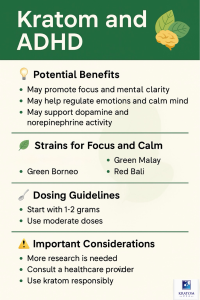 ADHD is characterized by dopamine and norepinephrine dysregulation—two neurotransmitters that play critical roles in attention, impulse control, and working memory.
ADHD is characterized by dopamine and norepinephrine dysregulation—two neurotransmitters that play critical roles in attention, impulse control, and working memory.
Kratom’s primary alkaloids, mitragynine and 7-hydroxymitragynine, act on opioid and adrenergic receptors in the brain. While kratom is not a stimulant in the same category as prescription ADHD medications, it may offer mild stimulant-like or calming effects, depending on the strain and dosage.
Key Effects Relevant to ADHD:
-
🧠 Enhanced cognitive clarity and task engagement (low doses, white/green strains)
-
💚 Calmer emotional state and reduced anxiety (moderate doses, red/green strains)
-
🌀 Possible support for dopamine pathways, which affect motivation and reward processing
🧪 What the Research Says
Although there are no clinical studies directly linking kratom to ADHD treatment, related findings provide useful insights.
📖 A 2017 user survey published in the Journal of Psychoactive Drugs reported that many users took kratom for focus, productivity, or emotional regulation, with self-reported benefits.
📖 A 2021 literature review in Frontiers in Pharmacology noted that mitragynine and its derivatives affect the central nervous system in dose-dependent ways—potentially offering stimulant or sedative effects.
These findings suggest that, although more controlled research is needed, kratom may influence some of the same systems targeted by ADHD medications.
💡 Best Kratom Strains for Focus and Emotional Balance
| Strain |
Primary Benefit |
Best Use Time |
| White Thai |
Focus, mental energy, productivity |
Morning/Afternoon |
| Green Malay |
Balanced mood + mild stimulation |
Late morning |
| Green Borneo |
Mental clarity + emotional balance |
Midday |
| Red Bali |
Calming, stress reduction |
Evening |
✅ White and green strains are typically best for improving focus
✅ Red strains may help users with hyperactivity or anxiety-related ADHD symptoms
🥄 Dosing Guidelines for Focus & ADHD Management
| Dosage |
Effect |
| 1–2 grams |
Light stimulation, sharper concentration |
| 2.5–4 grams |
Mental clarity, focus, stress relief |
| 5+ grams |
Sedating, not ideal for focus tasks |
💡 Start with a low dose and observe how your body reacts. ADHD symptoms can vary widely between individuals.
⚖️ Caution and Responsible Use
-
🚫 Kratom is not approved by the FDA for ADHD or any medical condition
-
🔁 Regular use can lead to tolerance or dependency if not carefully managed
-
🩺 Always consult a medical professional before using kratom as part of any self-treatment approach
🤔 FAQ: Kratom and ADHD
❓ Can kratom treat ADHD?
No. Kratom is not a medically recognized treatment for ADHD. However, some users report it helps manage symptoms like distractibility, anxiety, and lack of motivation.
❓ Which kratom strain is best for ADHD?
White Maeng Da and Green Malay are commonly used for focus and mental energy. Red strains may be better suited for hyperactive or emotionally reactive individuals.
❓ Can kratom replace Adderall or Ritalin?
Kratom may mimic some mild stimulant-like effects, but it is not a substitute for prescription ADHD medications. It may serve as a complementary aid for some people under professional supervision.
❓ Is kratom safe for teenagers with ADHD?
Kratom is not recommended for minors. Its long-term safety, especially in young people, has not been established.
❓ Are there any side effects?
Yes. Possible side effects include nausea, dizziness, dependency, and tolerance—especially at high doses or with daily use.
🌱 Final Thoughts: Can Kratom Support People With ADHD?
Kratom may offer mild focus-enhancing and calming effects that some users find helpful for managing ADHD symptoms. While it shouldn’t replace medical treatment or professional care, it could be a part of a broader strategy that includes lifestyle, diet, and natural support tools.
The key is to choose the right strain, use moderate doses, and stay informed. As interest in plant-based wellness grows, kratom may play a small but valuable role in supporting attention, productivity, and emotional regulation.
🛒 Explore lab-tested, focus-friendly kratom strains at KratomUSA.com — your trusted source for premium kratom powder and capsules.

by KratomUSA | Jun 25, 2025 | Kratom
😊 Kratom and Mood Support: Can This Natural Plant Help You Feel Better?
In a world where anxiety, depression, and daily stress weigh heavily on millions, more people are exploring natural options for emotional balance. Kratom, a tropical tree native to Southeast Asia, has caught attention not only for pain relief and energy but also for its potential to support mood and emotional wellness. Kratom’s mood-boosting potential comes from its unique alkaloids that interact with receptors in the brain related to serotonin, dopamine, and endorphin release. While kratom is not a cure for mood disorders, some users report it helps lift their mood, ease social anxiety, and promote motivation—especially when used in moderation. This article explores the science behind kratom and mood support, so you can make informed decisions about your health!
📌 Key Points: Kratom and Emotional Well-being
-
🌿 Kratom contains over 40 alkaloids that may support mood and stress relief
-
🧠 Some strains interact with dopamine and serotonin systems, possibly boosting mental clarity and calm
-
💚 Green and white vein strains may promote energy, motivation, and focus
-
🌙 Red strains may encourage relaxation and emotional balance
-
⚖️ Moderation, strain rotation, and self-awareness are key to avoiding tolerance
🌿 How Does Kratom Work in the Brain?
Kratom’s mood-related effects are largely due to alkaloids like:
-
Mitragynine – Acts on mu-opioid receptors, promoting a sense of well-being
-
7-hydroxymitragynine (7-HMG) – Potent, fast-acting alkaloid that enhances mood at low doses
-
Corynantheidine & Paynantheine – May interact with serotonin and dopamine pathways, influencing mood and mental clarity
🧪 A study published in the Journal of Psychoactive Drugs (2017) surveyed kratom users and found that 66% used kratom to improve mood or relieve anxiety, with many reporting noticeable improvement in overall emotional well-being.
🌞 Benefits of Kratom for Mood Support
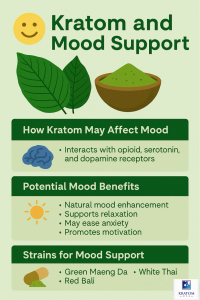 🔹 1. Natural Mood Enhancement
🔹 1. Natural Mood Enhancement
Many users report feeling more optimistic, motivated, and uplifted after taking kratom—especially in the morning or early afternoon.
Helpful strains:
-
Green Malay
-
White Borneo
-
Green Maeng Da
🔹 2. Social Anxiety and Confidence
Certain strains help promote calm and clarity, which may reduce social inhibition and improve interaction.
Helpful strains:
🔹 3. Relief from Mental Fatigue
Kratom may improve focus and cognitive drive, reducing feelings of burnout or mental fog.
Helpful strains:
-
Green Maeng da
-
Borneo Green Vein
🔹 4. Stress and Relaxation Support
Evening strains can promote a sense of ease, helping users wind down and reset emotionally.
Helpful strains:
💡 What Studies Say About Kratom and Mental Health
-
📖 A 2018 survey in Substance Use & Misuse found that most participants using kratom for mood management reported positive effects on anxiety, depression, and energy.
-
📖 A 2022 review in Frontiers in Psychiatry concluded that kratom may offer therapeutic value for mood disorders, although more clinical trials are needed.
While these results are promising, they also stress the need for:
🧪 How to Use Kratom Safely for Mood Support
| Dosage Level |
Typical Effect |
| 1–2 grams |
Mild stimulation, focus, motivation |
| 2–4 grams |
Balanced mood lift, calm energy |
| 4–6 grams |
Relaxation, anxiety relief, sedation |
✅ Start low and gradually increase if needed
✅ Rotate strains to avoid tolerance
✅ Avoid daily use to maintain effectiveness
💚 Strains Known for Mood Support
🤔 FAQ: Kratom and Mood Support
❓ Can kratom treat depression?
Kratom is not an FDA-approved treatment for depression. However, users report temporary relief from depressive symptoms, particularly with stimulating strains.
❓ Does kratom help with anxiety?
Many people use kratom to ease anxiety, particularly social anxiety. Red and green strains are most commonly chosen for their relaxing and balancing effects.
❓ What’s the best time of day to take kratom for mood?
For energy and motivation, take kratom in the morning. For stress relief or sleep support, take it later in the evening.
❓ Is kratom safe for long-term mood support?
Moderation is key. Using kratom occasionally and rotating strains can help reduce the risk of dependence and keep it effective.
❓ Is there scientific support for kratom’s mood effects?
While most data is anecdotal, multiple user surveys and observational studies suggest kratom may help with mood. More clinical trials are underway.
🌱 Final Thoughts: Can Kratom Help With Mood?
Kratom may offer natural mood support for those seeking relief from stress, low energy, or emotional fatigue. While it’s not a replacement for professional treatment, kratom could play a helpful role in boosting motivation, managing anxiety, and promoting emotional balance when used mindfully.
Always purchase kratom from lab-tested, reputable vendors and use responsibly.
🛒 Ready to explore premium kratom strains for mood support?
Visit KratomUSA.com for high-quality, lab-verified kratom capsules and powders trusted by thousands across the U.S.
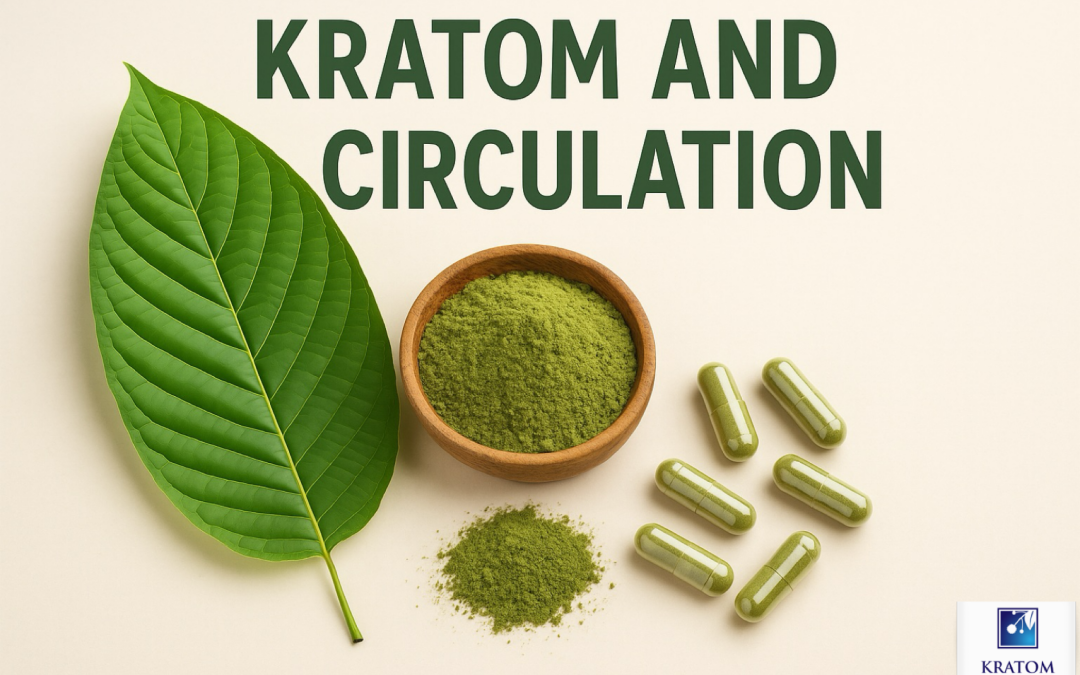
by KratomUSA | Jun 24, 2025 | Kratom
🫀 Kratom and Circulation: Can This Natural Herb Support Blood Flow?
Kratom (Mitragyna speciosa), a tropical plant native to Southeast Asia, is best known for its mood-enhancing and pain-relieving properties. But beyond its more familiar uses, some users and researchers have begun to ask: Can kratom improve blood circulation? While kratom isn’t typically marketed as a cardiovascular herb, anecdotal evidence and emerging insights suggest that certain alkaloids in kratom may influence blood pressure, heart rate, and overall circulation—both positively and negatively, depending on the dose, strain, and individual health status. This article explores the science behind kratom and circulation, its potential risks, and how it may fit into a natural wellness routine.
📌 Key Points: Kratom and Circulatory Health
-
🌿 Kratom contains alkaloids that affect the central nervous system and blood vessels
-
🧬 Some compounds may relax blood vessels, improving blood flow
-
🫁 Certain strains could reduce tension, stress, and inflammation, indirectly benefiting circulation
-
⚠️ High doses or long-term use may lead to changes in blood pressure or heart rate
-
✅ More clinical research is needed—but moderate, responsible use may support cardiovascular health
🧪 How Kratom Interacts with the Circulatory System
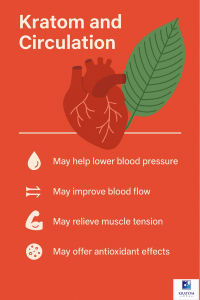 Kratom’s physiological effects are largely due to its active alkaloids, most notably:
Kratom’s physiological effects are largely due to its active alkaloids, most notably:
-
Mitragynine – The dominant alkaloid, known for stimulating effects at low doses and sedative effects at higher doses
-
7-hydroxymitragynine – A potent compound that affects mu-opioid receptors, with potential influence on blood pressure and vascular tone
-
Paynantheine and Speciogynine – Thought to promote smooth muscle relaxation, possibly contributing to vessel dilation
When kratom interacts with these systems, users may experience:
📖 Study Reference: A 2014 pharmacological review published in Drug and Alcohol Dependence noted that kratom’s alkaloids can have both stimulant and depressant effects, which may indirectly influence blood pressure and heart rate regulation.
🩸 Potential Circulatory Benefits of Kratom
🔹 1. Improved Blood Flow Through Vasodilation
Some kratom users report feeling a “flush” or warmth in the skin—likely due to blood vessel dilation. This may be tied to kratom’s action on smooth muscle and adrenergic receptors.
Relevant Strains: Red Maeng Da, Green Malay
Best Use: Low-to-moderate doses in the evening
🔹 2. Reduced Anxiety and Stress
High stress levels lead to vasoconstriction and poor circulation. Kratom’s calming properties may help reduce:
Relevant Strains: Red Bali, Red Borneo
🔹 3. Anti-Inflammatory Properties
Inflammation impairs circulation and is linked to cardiovascular disease. Kratom’s anti-inflammatory potential, especially in red strains, may contribute to vascular health.
📖 Study Reference: A 2020 study in Frontiers in Pharmacology explored kratom’s ability to reduce inflammation markers in animal models.
⚠️ Potential Circulatory Risks of Kratom
While some people experience improved circulation with kratom, others may face opposite effects, particularly with:
❗ Possible Risks Include:
-
Elevated heart rate (tachycardia) in stimulant doses (1–3 grams)
-
Blood pressure fluctuations (especially with white vein kratom)
-
Dependency, which can indirectly increase cardiovascular stress
📖 Note: A 2018 review in Journal of Clinical Psychopharmacology cautioned that kratom may cause cardiovascular side effects in sensitive individuals, particularly with excessive use.
🌿 Strains That May Support Circulation
| Strain |
Primary Alkaloids |
Circulation Effects |
| Green Malay |
Mitragynine, Speciogynine |
Balanced energy, anti-stress |
| Red Bali |
7-HMG, Paynantheine |
Muscle relaxation, calming effect |
| Red Borneo |
Mitragynine, Corynantheidine |
Anti-inflammatory, mood support |
| Red Maeng Da |
7-HMG, Speciogynine |
Vasodilation, tension relief |
💡 Pro Tip: Avoid white vein strains if you’re prone to high blood pressure—they can increase heart rate in sensitive users.
✅ How to Use Kratom for Circulatory Support
🥄 Dosage Guide
| Dosage |
Effect |
| 1–2 grams |
Light stimulation, increased focus |
| 2.5–4 grams |
Relaxation, improved blood flow |
| 5+ grams |
Sedative effects, possible blood pressure drop |
⏱️ Timing
💧 Hydration Matters
Kratom can mildly dehydrate the body. Drink plenty of water or electrolytes to support blood volume and flow.
🤔 FAQ: Kratom and Circulation
❓ Can kratom improve circulation?
Some users report better circulation and warmer extremities, likely due to kratom’s relaxing effects on blood vessels.
❓ Does kratom affect blood pressure?
Yes. Depending on dose and strain, it can either raise or lower blood pressure. Monitor your body’s response carefully.
❓ Is kratom safe for people with heart conditions?
Kratom should be used with caution. Speak with your doctor if you have hypertension, arrhythmia, or other cardiac issues.
❓ What’s the best kratom strain for healthy circulation?
Green Malay and Red Bali offer a good balance of relaxation and anti-inflammatory properties.
❓ Can kratom cause poor circulation?
In rare cases—especially with high doses or chronic use—it may contribute to vasoconstriction or elevated blood pressure.
🫀 Final Thoughts: Kratom and Circulatory Health
Kratom is not a cardiovascular supplement by design—but its muscle-relaxing, anti-inflammatory, and calming properties may offer indirect benefits for circulation and blood flow. As with any herb, it’s essential to listen to your body, avoid overuse, and use high-quality, lab-tested kratom.
If you’re seeking natural support for circulation, kratom may play a helpful role—especially as part of a larger wellness plan focused on stress reduction, hydration, and anti-inflammatory nutrition.
🛍️ Explore circulation-friendly kratom strains at KratomUSA.com — your trusted source for lab-tested, pure kratom powders and capsules.

 The effects of kratom vary depending on the dose, strain, and the user’s physiology. At low doses, kratom tends to act as a stimulant, promoting energy and focus. At higher doses, it acts more like a sedative or analgesic.
The effects of kratom vary depending on the dose, strain, and the user’s physiology. At low doses, kratom tends to act as a stimulant, promoting energy and focus. At higher doses, it acts more like a sedative or analgesic.



 When evaluating an online kratom seller, these criteria are essential:
When evaluating an online kratom seller, these criteria are essential:
 ADHD is characterized by dopamine and norepinephrine dysregulation—two neurotransmitters that play critical roles in attention, impulse control, and working memory.
ADHD is characterized by dopamine and norepinephrine dysregulation—two neurotransmitters that play critical roles in attention, impulse control, and working memory.
 🔹 1. Natural Mood Enhancement
🔹 1. Natural Mood Enhancement
 Kratom’s physiological effects are largely due to its
Kratom’s physiological effects are largely due to its